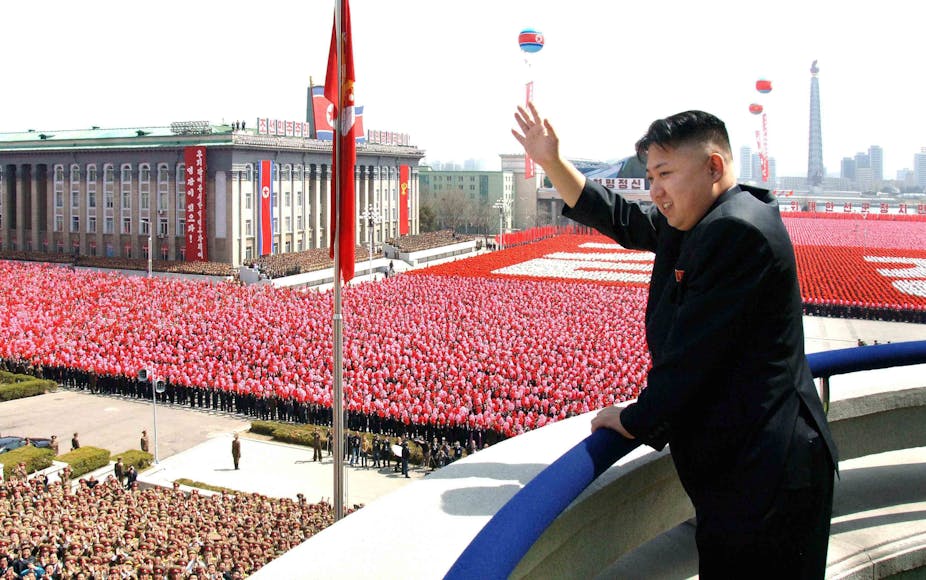The technical aspects of North Korea’s failed rocket launch last week are less interesting than the political undercurrents swirling around this event.
Yesterday, the UN announced increased sanctions for North Korea as a response to the launch, but this may not make much of a difference.
The rocket’s explosion has spared the United States and its regional allies some loss of face while for North Korea, it represents a missed opportunity for Pyongyang to maximise its diplomatic and strategic leverage, over and above any threat to Kim Jong-un’s legitimacy as leader.
Domestic politics
The failed test is unlikely to represent a hammer blow to Kim Jong-un’s legitimacy as North Korean leader, but it may yield clues about the machinations of North Korea’s leadership transition.
For Kim Jong-un, the importance of the launch probably lay in the commitment it signalled to the military, the most important institution of the state. In this context, the failure of the test is a technical problem of limited relevance to succession politics. The important point for Kim’s legitimacy is that the test was conducted in the first place.
While a blow to national pride, the exploding rocket is unlikely to have stirred the passions of the average North Korean immersed in the daily grind of survival. Just as the explosion of Space Shuttle Columbia meant little for the standing of US President George W Bush in 2003, it is doubtful that the Unha-3 failure has altered the opinion of Kim Jong-un among the masses, being too far removed from their everyday experience.
Foreign policy

Domestic politics notwithstanding, the international community was presumably the primary audience for the Unha-3 launch. The failure of the rocket was a blow to Pyongyang because of the negative signal it sent regarding the technical progress of its missile program and therefore the operability of its nuclear weapon capability.
Nuclear weapon states enjoy greater prestige and diplomatic clout in international relations as a result of their nuclear weapon capability.
A successful test would have demonstrated the viability of North Korea’s long-range missiles as a nuclear delivery system, boosted the deterrence value of its nuclear weapon capability and increasing its strategic and diplomatic leverage in relation to its northeast Asian neighbours.
The failure of the Unha-3 launch diminishes North Korea’s “nuclear shadow” — the impact of Pyongyang’s nuclear weapons on its diplomatic relations with other states — along with its ability to use this event as a bargaining chip to extract further aid from the international community.
International community dodges a bullet
The UN sanctions, as with past responses to North Korean provocations, reflects the unique limitations bounding nuclear diplomacy on the Korean peninsula.
The use of force is off the table due to significant constraints on military action in the Korean theatre. Due to its close proximity to the Demilitarized Zone (DMZ), Seoul is essentially indefensible against North Korean rockets and artillery.
The estimated cost of war and reunification should an American military action escalate to full-scale war is estimated in the trillions of dollars and millions of lives, borne largely by South Korea. For any rational military strategist, the risks of an armed response to North Korea’s pin-prick provocations are too great.
The ability of regional states to influence Pyongyang through economic sanctions has been similarly ineffective. A variety of sanctions have been imposed on North Korea, which have restricted its trading relationships to interactions with only a handful of countries and limited its export income.
But the sanctions regime has been ineffectual because North Korea has limited links to the global economy over which the US government has leverage, and where linkages do exist, other Northeast Asian states have shown limited enthusiasm for enforcement.
A united front among regional states is vital to the success of international pressure, however unity is hard to come by in a region characterised by the emerging hegemonic contest between the United States and China.
Lacking the means to compel
Regional states lack the necessary strategic and economic leverage to decisively influence North Korean decision-making. The international response to North Korea’s Unha-3 rocket launch should be understoof with this in mind.
The lack of regional consensus gives Pyongyang great leverage in regional diplomacy and provides space for the regime to engage in provocative behaviour, in the knowledge that angry rhetoric and a clumsy sanctions regime are the worst it has to fear as a response from the international community.

